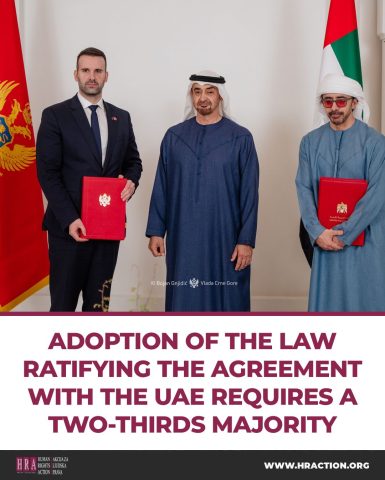
STATEMENT REGARDING INSULTS, THREATS, AND HARASSMENT OF A GRADSKA TV JOURNALIST
26/04/2025
MURINO – 26 YEARS LATER, IMPORTANT STEPS TOWARD JUSTICE FOR THE VICTIMS
30/04/2025ADOPTION OF THE LAW RATIFYING THE AGREEMENT WITH THE UAE REQUIRES A TWO-THIRDS MAJORITY

Human Rights Action (HRA) expresses concern over a violation of the Constitution of Montenegro in the adoption of the Law on the Ratification of the Agreement on Cooperation between the Government of Montenegro and the Government of the United Arab Emirates, which facilitates the implementation of projects in the areas of “tourism and mixed-use real estate development” on Montenegrin territory.
This law was approved by the Parliament of Montenegro with a simple majority of 46 votes, despite Article 91, paragraph 3 of the Constitution of Montenegro clearly stating that laws regulating property rights of foreigners must be adopted by a two-thirds majority of all Members of Parliament. This means at least 54 votes are required for adoption.
It is evident that the Law on the Ratification of the Agreement on Cooperation regarding tourism and real estate development between Montenegro and the UAE governs property rights of foreigners. The Agreement grants foreigners property rights over land classified as “development zones” for real estate projects, including the possibility of expropriation and the transfer of ownership of immovable property to foreign entities. Thus, it is clear that its ratification necessitated a qualified (two-thirds) majority.
If the law comes into effect, HRA will submit an initiative to the Constitutional Court to assess the constitutionality of the adoption procedure.
The Constitutional Court of Montenegro has previously established that it possesses the authority to review the constitutionality of the procedures for adopting international treaties. In its examination of the Law on the Ratification of the North Atlantic Treaty and the Protocol on the Accession of Greece and Turkey, the Court stated that it “may assess the formal constitutionality of the law ratifying an international treaty, i.e., the procedure of its adoption, but cannot evaluate the substantive legal content of the treaty itself.”
Given that the President of Montenegro has returned the law to Parliament for reconsideration, we expect that the Parliament will apply the requirement for a two-thirds majority as prescribed by Article 91, paragraph 3 of the Constitution during the next vote.
Additionally, HRA warns that the Agreement defines public interest too broadly for the implementation of unspecified projects, which jeopardizes the right of Montenegrin citizens to peacefully enjoy their property in the areas referenced in the Agreement (north and south of Montenegro). Such a broad definition of public interest for real estate development projects facilitates large-scale expropriation of land in favor of foreign property rights. This represents a state interference with the property rights of domestic citizens and other property owners in Montenegro—rights that are protected under Article 58 of the Constitution.
HRA also expresses concern regarding the lack of transparency in declaring public interest for unspecified projects, which could jeopardize the property rights of an indeterminate number of citizens and have equally unpredictable implications for environmental protection—a fundamental value of Montenegro as an ecological state.







 English
English